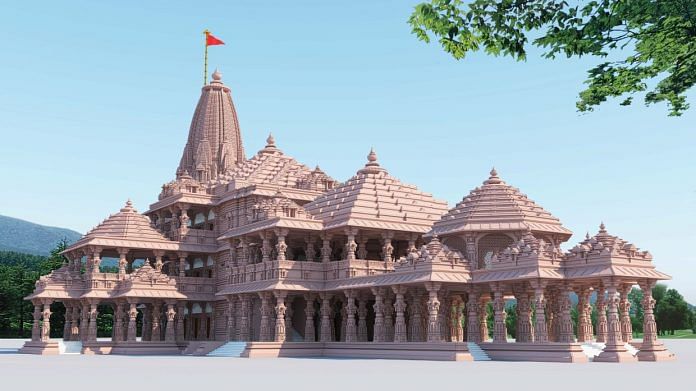
Thank you dear subscribers, we are overwhelmed with your response.
Your Turn is a unique section from ThePrint featuring points of view from its subscribers. If you are a subscriber, have a point of view, please send it to us. If not, do subscribe here: https://theprint.in/
With the first anniversary of the commencement of the Ram Temple construction in Ayodhya upon us, I try to explore the rise of religious nationalism and majoritarianism in global politics.
A brief history
Last year, right in the middle of the pandemic, we witnessed two very similar efforts to divert public discourse away from COVID-19.
At one end of Asia, we watched the beginning of the construction of the Ram temple in the disputed land of Ayodhya, which according to popular Hindu belief, is the exact birthplace of Lord Rama. This was a contentious issue because the disputed land was occupied by Babri Masjid, which stood there since the 16th century. However, in 1992 the mosque was demolished by an agitated mob of Hindu nationalists that triggered widespread communal tensions across India.
In 2019, the Supreme Court of India handed over the disputed land to a Hindu trust to start building the temple. The following year, the Prime Minister of India attended the ground-breaking ceremony that marked the commencement of the Ram temple construction. While the event was widely celebrated across the Hindu majority, it was denounced by the Muslim minorities.
The Hagia Sophia in Istanbul also has a perplexing history. In 1934, the founding father of modern Turkey, Mustafa Kemal Atatürk, turned it into a museum as he envisaged it as a symbol of secularism and liberalism. Fast forward to 2020, and the President-turned-dictator Recep Tayyip Erdogan’s decree to turn the Hagia Sophia museum into a mosque makes this UNESCO world heritage site a symbol of religious nationalism.
The similarities
These two events do have a lot in common. For starters, both were a pertinent demand of the majority religion in the respective nations. Moreover, the incumbent government in both these countries showed unequivocal support towards these developments. In India’s case, the government even justified the transgression by its supporters in 1992 and portrayed it as a victory of their religion.
These moves came at a time when both countries were struggling to contain the spread of COVID-19, and the induced economic impact from the pandemic had battered the job market creating mass unemployment in both nations. To counter their dwindling popularity, both the governments relied upon such moves to appeal to the religious sentiments of the majority to garner public support during times of social and economic distress.
The ulterior motive
The whole idea behind these moves was to revive the nostalgic sentiments among the masses and ride the populist wave to divert the public discourse away from the raging consequences of COVID-19. That is why we saw widespread “Hindufication” and “Islamisation” of historical events, monuments, and cities in India and Turkey, respectively. The formula is simple, ‘If I cannot provide you with a better future, let me restore to you your glorious past.’
It also tells us that the ideology of secular nationalism is increasingly being replaced by majoritarianism in global politics. In our case, the politicians have incorrectly asserted that the religion in the majority is entitled to a certain degree of primacy in society. Our founding fathers established the concept of secularism as one of the central pillars of nation-building. But now, unfortunately, with the dominating rise of populist propaganda and extremist ideologies, we are becoming more polarised than ever before. Therefore, it’s high time we start asking our political class some unsettling questions. Are they here to build us a better future, or to exult a glorified past?
Also read: Ram temple in Ayodhya to welcome devotees by December 2023
These pieces are being published as they have been received – they have not been edited/fact-checked by ThePrint.

COMMENTS